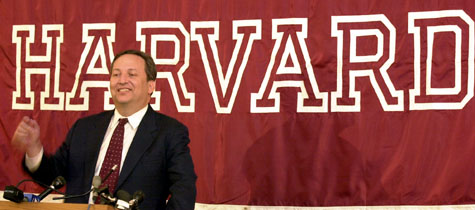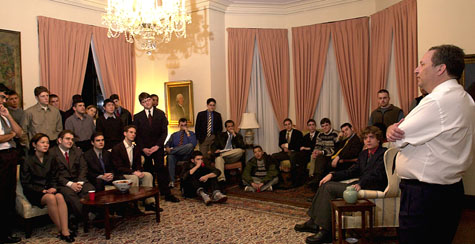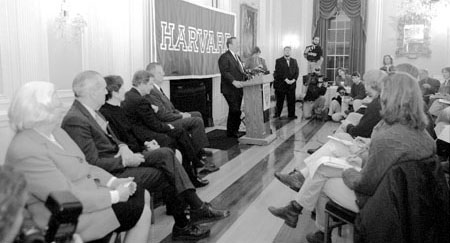Summers is ‘excited, exhilarated, a little bit daunted’

Through his years of graduate study and nearly a decade as a Harvard economics professor, Lawrence H. Summers never thought about someday taking the reins of the University.
Sitting in a Loeb House parlor on Sunday, March 11, before being presented to the public as the next Harvard president, however, Summers said he is greatly looking forward to his new role.
“I can’t say it [the presidency] was ever my focus,” Summers said. “I was always very interested in the University and all its aspects, though, so it’s a special thrill – considering the time I spent here as a student and faculty member – to be back.”
As the media filed through Loeb House’s front door, packing notebooks and television cameras, an air of quiet expectancy filled the building. That Summers was to be named Harvard’s 27th president had been speculated about for days. That he was to be publicly named at the news conference was also widely known.
Though the surprise was gone, the feeling, the “special thrill” that Summers referred to, was still there. When asked about his emotions, Summers said he was exhilarated, but knew he had a big job awaiting him.
“[I am] excited, exhilarated, a little bit daunted, but looking forward very much to the challenge,” Summers said.

Summers wasn’t the only one excited by his appointment. One of the first hands he shook when he got to campus last weekend was that of freshman Alexandra Moss. Moss had taken a break from her midterm studies, wandered out of Lamont Library, and into the path of Harvard’s incoming president as he walked from the car to Loeb House.
Moss was studying for her midterm in Ec 10, a class for which Summers was once a teaching fellow. Take away a couple of decades and Summers could have been meeting Moss outside of Loeb House to give her a hand with the course’s tougher material.
Meeting Moss wasn’t a bad way for Summers to begin his reintroduction to campus. She’s already a fan, saying she had been pulling for him to emerge as President Neil L. Rudenstine’s successor since she heard him speak at the Institute of Politics last fall.
“I’m so psyched that he’s the next president. I was really hoping it was him. I think he’s brilliant,” said Moss.
The naming of the new president also became the occasion for a demonstration by the Progressive Student Labor Movement (PSLM), which has been pushing University officials to adopt a living wage for Harvard’s lowest-paid workers.
A question from the media about the PSLM’s complaints led Summers to remark that he plans to meet with many groups at the University, including students. He started working on that particular pledge on Sunday night, meeting with student leaders on the Undergraduate Council.
During the quiet moments before his public introduction, Summers said he wanted to work with faculty and students to ensure that teaching and research are as effective at Harvard as they can possibly be. A few moments later, in front of the cameras, Summers talked about the “ivory tower’s” fabled remoteness being something of a myth. Research on everything from economics to science to art is rapidly incorporated into society these days. And education has never been as important or as far-reaching, Summers said.
“As I’ve traveled widely over the last number of years, I’ve been so very often struck by the leaders I have met talking about their participation for a year, or two years, or four years, in a degree program at Harvard or another American university, and how that experience changed their lives and changed the way in which they have governed,” Summers said. “So the opportunities for this great university have probably never been greater.”





